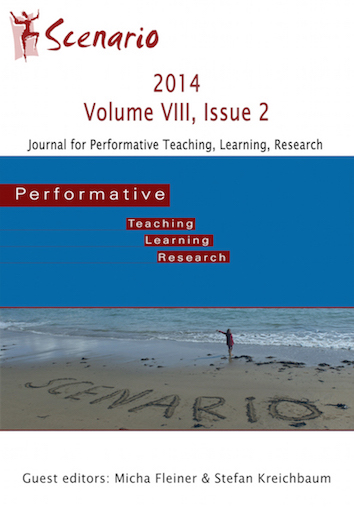Shall I Approach Thee Through Improvised Play? Dramatising Poetry
DOI:
https://doi.org/10.33178/scenario.8.2.10Abstract
Dramatising poetry in the language classroom – why and how? I first realised the dramatic potential of poetry when adapting Shakespeare’s sonnets for a university drama club. Staging a full-length play based on a poetry-cycle is usually not possible in class, but individual poems are mostly short and thus well-suited for exploration during a class-period. Despite this being a window of practice article, I will give a short overview of reasons for approaching poetry through drama before I describe concrete exercises. Moreover, besides ideas for dramatising Shakespearean sonnets, other authors’ ideas about dramatising poetry in general will be included as well. The articles that resulted from my database search on 'dramatising poetry' focus on two different target groups. Articles about poetry in L1 classrooms tend to focus on how students can be encouraged to appreciate poetry in itself (Feinberg 1979, Taylor 1994, Comeaux 1994) or on how certain types of poems can be taught (Rodberg & Jennings 2007 or Newlin & Bradford 2011 on sonnets). Texts about poetry in foreign/second language classrooms, however, often see poetry as a means to an end, a tool for improving learners’ language proficiency (Tomlinson 1986, Gasparro & Falletta 1994, Elting & Firkins 2006, Hestnes ...Riferimenti bibliografici
Comeaux, Patricia (1994): Performing Poetry: Centering the Language Arts Programme. In: Contemporary Education 65/2, 77-81
Ehrlich, Jeremy (2002): Page to Stage (A Lesson in Performance). In: The Folger Shakespeare Library. Available from: http://pages.simonandschuster.com/ images/ ckfinder/ 26/ pdfs/ Folger%20Curriculum%20Guides/ sonnets.pdf (Accessed 15 September 2015)
Elting, Stephen; Firkins, Arthur (2006): Dramatising Poetry in the Second Language Classroom. In: English Teaching: Practice and Critique 5/3, 127-136. Available from: http://education.waikato.ac.nz/research/files/etpc/2006v5n3art5.pdf (Accessed 15 September 2015)
Feinberg, Rose M. (1979): Poetry Theater--Integrating Drama and Poetry. Paper presented at the combined Annual Meeting of the Conference on English Education and the Secondary School English Conference (Pittsburgh, PA, March 15-18, 1979). ERIC Clearinghouse on Languages and Linguistics, Washington, DC.ED185573
Gasparro, Marie; Falletta, Bernadette (1994): Creating Drama with Poetry. Teaching English as a Second Language through Dramatization and Improvisation. ERIC Clearinghouse on Languages and Linguistics, Washington, DC. ED368214
Hadaway, L.; Vardell S.; Young, T. (2001): Scaffolding Oral Language Development through Poetry for Students Learning Language. In: The Reading Teacher 54/8, 796-806
Hestnes, Hæge (2009): Using Poetry in the ESL Classroom. Available from: http://www.fremmedspraksenteret.no/nor/fremmedspraksenteret/larings---ressurser/leseveiledning-i-engelsk/text-types/poetry-1&PHPSESSID=aspae4mi2rqmu29uimccu9irh5 (Accessed 15 September 2015)
Newlin, Louisa; Bradford, Gigi (2011): Teaching Sonnets Unit Plan. In: The Folger Shakespeare Library. Available from: http://www.folger.edu/Content/Teach-and-Learn/Teaching-Resources/Teaching-Sonnets/ (Accessed 15 September 2015)
Rodberg, Simon; Jennings, Caleen S. (2007): Performing Sonnets. In: The Folger Shakespeare Library. Available from: http://www.folger.edu/eduLesPlanDtl.cfm?lpid=795 (Accessed 15 September 2015)
Stöver-Blahak, Anke (2012): Sprechen und Vortragenlernen im Fremdsprachenunterricht. Interpretativ, kreativ und ganzheitlich mit Gedichten. Frankfurt: PeterLang
Taylor, Andrew (1994): 'On the pulse': Exploring Poetry through Drama. In: Children's Literature in Education 25/1, 17-28
Tomlinson, Brian (1986): Using Poetry with Mixed Ability Language Classes. In: ELT Journal 40/1, 33-41
Dowloads
Pubblicato
Fascicolo
Sezione
Licenza
Copyright (c) 2014 the author(s)

Questo volume è pubblicato con la licenza Creative Commons Attribuzione - Non commerciale - Non opere derivate 4.0 Internazionale.







